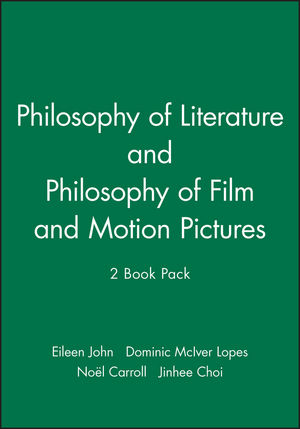Philosophy of Literature & Philosophy of Film and Motion Pictures, 2 Book SetISBN: 978-0-470-43549-6
Paperback
826 pages
July 2008, Wiley-Blackwell
 |
||||||
Philosophy of Literature: Contemporary and Classic Readings - An Anthology
Edited by Eileen John and Dominic McIver Lopes
ISBN: 9781405112086
Acknowledgments.
Preface.
Part I: Classic Sources.
Introduction.
1. Republic: Plato.
2. Poetics: Aristotle.
3. Of Tragedy: David Hume.
4. The Birth of Tragedy: Friedrich Nietzsche.
5. Creative Writers and Day-Dreaming: Sigmund Freud.
Part II: Definition of Literature.
Introduction.
6. Spazio: Arrigo Lora-Totino.
7. What Isn't Literature?: E. D. Hirsch, Jr.
8. The Concept of Literature: Monroe Beardsley.
9. Literary Practice: Peter Lamarque and Stein Haugom Olsen.
10. What Is Literature?: Robert Stecker.
Part III: Ontology of Literature.
Introduction.
11. Pierre Menard, Author of the Quixote: Jorge Luis Borges.
12. Literary Works as Types: Richard Wollheim.
13. Literature: J. O. Urmson.
14. Can the Work Survive the World?: Nelson Goodman and Catherine Elgin.
15. Work and Text: Gregory Currie.
Part IV: Fiction.
Introduction.
16. Doonesbury: Garry Trudeau.
17. The Logical Status of Fictional Discourse: John Searle.
18. Truth in Fiction: David Lewis.
19. What Is Fiction?: Gregory Currie.
20. Fiction and Nonfiction: Kendall Walton.
21. Fictional Characters as Abstract Artifacts: Amie Thomasson.
22. Logic and Criticism: Peter Lamarque.
Part V: Emotion.
Introduction.
23. Applicant: Harold Pinter.
24. How Can We Be Moved by the Fate of Anna Karenina?: Colin Radford.
25. Fearing Fictionally: Kendall Walton.
26. The Pleasures of Tragedy: Susan Feagin.
27. Tragedy and the Community of Sentiment: Flint Schier.
Part VI: Metaphor.
Introduction.
28. Essay on What I Think about Most: Anne Carson.
29. Metaphor: Max Black.
30. What Metaphors Mean: Donald Davidson.
31. Metaphor and Feeling: Ted Cohen.
32. Metaphor and Prop Oriented Make-Believe: Kendall Walton.
Part VII: Interpretation.
Introduction.
33. Who Is Responsible in Ethical Criticism, And for What?: Wayne C. Booth.
34. Criticism as Retrieval: Richard Wollheim.
35. The Postulated Author: Critical Monism as a Regulative Ideal: Alexander Nehamas.
36. Art Interpretation: Robert Stecker.
37. Art, Intention, and Conversation: Noël Carroll.
38. Intention and Interpretation: Jerrold Levinson.
39. Style and Personality in the Literary Work: Jenefer Robinson.
Part VIII: Literary Values.
Introduction.
40. Xingu: Edith Wharton.
41. On the Cognitive Triviality of Art: Jerome Stolnitz.
42. Literature and Knowledge: Catherine Wilson.
43. Finely Aware and Richly Responsible: Martha Nussbaum.
44. Literature, Truth, and Philosophy: Peter Lamarque and Stein Haugom Olsen.
45. The Ethical Criticism of Art: Berys Gaut.
Index
Philosophy of Film and Motion Pictures: An Anthology
Edited by Noël Carroll and Jinhee Choi
ISBN: 9781405120272
Acknowledgments.
General Introduction.
Part I: Film as Art.
Introduction.
1 Roger Scruton.
Photography and Representation.
2 Dominic McIver Lopes.
The Aesthetics of Photographic Transparency.
3 Terrence Rafferty.
Everybody Gets a Cut: DVDs Give Viewers Dozens of Choices -- and That's the Problem.
Part II: What Is Film?
Introduction.
4 Stanley Cavell.
From The World Viewed.
5 Susanne K. Langer.
A Note on the Film.
6 F. E. Sparshott.
Vision and Dream in the Cinema.
7 Gregory Currie.
The Long Goodbye: The ImaginaryLanguage of Film.
8 Arthur C. Danto.
Moving Pictures.
9 Noël Carroll.
Defining the Moving Image.
Part III: Documentary.
Introduction.
10 Gregory Currie.
Visible Traces: Documentary and the Contents of Photographs.
11 Noël Carroll.
Fiction, Non-Fiction, and the Film of Presumptive Assertion: A Conceptual Analysis.
Part IV: Film Narrative/Narration.
Introduction.
12 George Wilson.
Le Grand Imagier Steps Out: The Primitive Basis of Film Narration.
13 Gregory Currie.
Unreliability Refigured: Narrative in Literature and Film.
Part V: Film and Emotion.
Introduction.
14 Noël Carroll.
Film, Emotion, and Genre.
15 Kendall Walton.
Fearing Fictions.
16 Alex Neill.
Empathy and (Film) Fiction.
17 Berys Gaut.
Identification and Emotion in Narrative Film.
18 Deborah Knight.
In Fictional Shoes: Mental Simulation and Fiction.
Part VI: Topics in Film Criticism.
Introduction.
19 George M. Wilson.
Morals for Method.
20 Paisley Livingston.
Cinematic Authorship.
21 Jinhee Choi.
National Cinema, the Very Idea.
Part VII: Film and Ethics.
Introduction.
22 Joseph H. Kupfer.
Film Criticism and Virtue Theory.
23 Mary Devereaux.
Beauty and Evil: The Case of Leni Riefenstahl's Triumph of the Will.
24 Melinda Vadas.
A First Look at the Pornography: Civil Rights Ordinance: Could Pornography Be the Subordination of Women?
Part VIII: Film and Knowledge.
Introduction.
25 Bruce Russell.
The Philosophical Limits of Film.
26 Karen Hanson.
Minerva in the Movies: Relations Between Philosophy and Film.
27 Lester H. Hunt.
Motion Pictures as a Philosophical Resource.
Select Bibliography by Jinhee Choi.
Index.



